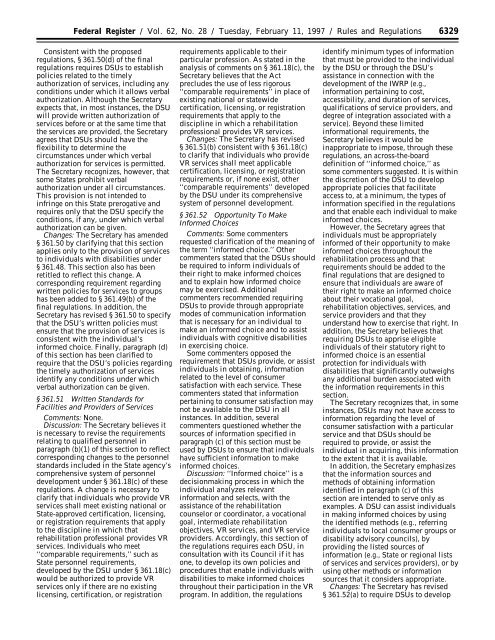federal register - U.S. Government Printing Office
federal register - U.S. Government Printing Office
federal register - U.S. Government Printing Office
You also want an ePaper? Increase the reach of your titles
YUMPU automatically turns print PDFs into web optimized ePapers that Google loves.
Federal Register / Vol. 62, No. 28 / Tuesday, February 11, 1997 / Rules and Regulations6329Consistent with the proposedregulations, § 361.50(d) of the finalregulations requires DSUs to establishpolicies related to the timelyauthorization of services, including anyconditions under which it allows verbalauthorization. Although the Secretaryexpects that, in most instances, the DSUwill provide written authorization ofservices before or at the same time thatthe services are provided, the Secretaryagrees that DSUs should have theflexibility to determine thecircumstances under which verbalauthorization for services is permitted.The Secretary recognizes, however, thatsome States prohibit verbalauthorization under all circumstances.This provision is not intended toinfringe on this State prerogative andrequires only that the DSU specify theconditions, if any, under which verbalauthorization can be given.Changes: The Secretary has amended§ 361.50 by clarifying that this sectionapplies only to the provision of servicesto individuals with disabilities under§ 361.48. This section also has beenretitled to reflect this change. Acorresponding requirement regardingwritten policies for services to groupshas been added to § 361.49(b) of thefinal regulations. In addition, theSecretary has revised § 361.50 to specifythat the DSU’s written policies mustensure that the provision of services isconsistent with the individual’sinformed choice. Finally, paragraph (d)of this section has been clarified torequire that the DSU’s policies regardingthe timely authorization of servicesidentify any conditions under whichverbal authorization can be given.§ 361.51 Written Standards forFacilities and Providers of ServicesComments: None.Discussion: The Secretary believes itis necessary to revise the requirementsrelating to qualified personnel inparagraph (b)(1) of this section to reflectcorresponding changes to the personnelstandards included in the State agency’scomprehensive system of personneldevelopment under § 361.18(c) of theseregulations. A change is necessary toclarify that individuals who provide VRservices shall meet existing national orState-approved certification, licensing,or registration requirements that applyto the discipline in which thatrehabilitation professional provides VRservices. Individuals who meet‘‘comparable requirements,’’ such asState personnel requirements,developed by the DSU under § 361.18(c)would be authorized to provide VRservices only if there are no existinglicensing, certification, or registrationrequirements applicable to theirparticular profession. As stated in theanalysis of comments on § 361.18(c), theSecretary believes that the Actprecludes the use of less rigorous‘‘comparable requirements’’ in place ofexisting national or statewidecertification, licensing, or registrationrequirements that apply to thediscipline in which a rehabilitationprofessional provides VR services.Changes: The Secretary has revised§ 361.51(b) consistent with § 361.18(c)to clarify that individuals who provideVR services shall meet applicablecertification, licensing, or registrationrequirements or, if none exist, other‘‘comparable requirements’’ developedby the DSU under its comprehensivesystem of personnel development.§ 361.52 Opportunity To MakeInformed ChoicesComments: Some commentersrequested clarification of the meaning ofthe term ‘‘informed choice.’’ Othercommenters stated that the DSUs shouldbe required to inform individuals oftheir right to make informed choicesand to explain how informed choicemay be exercised. Additionalcommenters recommended requiringDSUs to provide through appropriatemodes of communication informationthat is necessary for an individual tomake an informed choice and to assistindividuals with cognitive disabilitiesin exercising choice.Some commenters opposed therequirement that DSUs provide, or assistindividuals in obtaining, informationrelated to the level of consumersatisfaction with each service. Thesecommenters stated that informationpertaining to consumer satisfaction maynot be available to the DSU in allinstances. In addition, severalcommenters questioned whether thesources of information specified inparagraph (c) of this section must beused by DSUs to ensure that individualshave sufficient information to makeinformed choices.Discussion: ‘‘Informed choice’’ is adecisionmaking process in which theindividual analyzes relevantinformation and selects, with theassistance of the rehabilitationcounselor or coordinator, a vocationalgoal, intermediate rehabilitationobjectives, VR services, and VR serviceproviders. Accordingly, this section ofthe regulations requires each DSU, inconsultation with its Council if it hasone, to develop its own policies andprocedures that enable individuals withdisabilities to make informed choicesthroughout their participation in the VRprogram. In addition, the regulationsidentify minimum types of informationthat must be provided to the individualby the DSU or through the DSU’sassistance in connection with thedevelopment of the IWRP (e.g.,information pertaining to cost,accessibility, and duration of services,qualifications of service providers, anddegree of integration associated with aservice). Beyond these limitedinformational requirements, theSecretary believes it would beinappropriate to impose, through theseregulations, an across-the-boarddefinition of ‘‘informed choice,’’ assome commenters suggested. It is withinthe discretion of the DSU to developappropriate policies that facilitateaccess to, at a minimum, the types ofinformation specified in the regulationsand that enable each individual to makeinformed choices.However, the Secretary agrees thatindividuals must be appropriatelyinformed of their opportunity to makeinformed choices throughout therehabilitation process and thatrequirements should be added to thefinal regulations that are designed toensure that individuals are aware oftheir right to make an informed choiceabout their vocational goal,rehabilitation objectives, services, andservice providers and that theyunderstand how to exercise that right. Inaddition, the Secretary believes thatrequiring DSUs to apprise eligibleindividuals of their statutory right toinformed choice is an essentialprotection for individuals withdisabilities that significantly outweighsany additional burden associated withthe information requirements in thissection.The Secretary recognizes that, in someinstances, DSUs may not have access toinformation regarding the level ofconsumer satisfaction with a particularservice and that DSUs should berequired to provide, or assist theindividual in acquiring, this informationto the extent that it is available.In addition, the Secretary emphasizesthat the information sources andmethods of obtaining informationidentified in paragraph (c) of thissection are intended to serve only asexamples. A DSU can assist individualsin making informed choices by usingthe identified methods (e.g., referringindividuals to local consumer groups ordisability advisory councils), byproviding the listed sources ofinformation (e.g., State or regional listsof services and services providers), or byusing other methods or informationsources that it considers appropriate.Changes: The Secretary has revised§ 361.52(a) to require DSUs to develop


